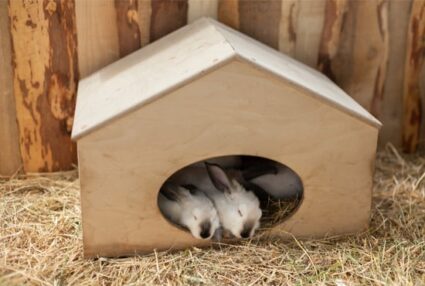Rabbits need about eight hours of sleep per day. If your rabbit isn’t sleeping enough, this may be a sign of a medical problem. Often, rabbits sleep with their eyes open, so it can be difficult to tell if they’re awake or asleep.
A sleeping rabbit will lie on its front, side or in the loaf position. Its breathing will slow down, and its nose will stop wiggling. Its ears will relax, and it may snore. Some rabbits twitch as they dream. Rabbits usually sleep deeply around noon and during the middle of the night.
We’ll look at why rabbits sleep with their eyes open, and how to tell if your rabbit is sleeping. We’ll advise on how much sleep your rabbit should get, and when rabbits tend to sleep. We’ll also share some advice and tips on how to get your rabbit to sleep at night.
Do Rabbits Sleep with Their Eyes Open or Closed?
Many owners believe that their rabbit doesn’t sleep. Or if they do sleep, they’ve never witnessed it. Some rabbits always seem to be awake. They’re either running around and playing, or sitting still with their eyes open.
In reality, all rabbits sleep. They sleep for two large time periods, as well as taking several naps throughout their waking hours. Rabbits prefer to get their sleep in short bursts rather than all at once. It’s easy to mistake a sleeping rabbit with one that’s relaxed but awake. To add to the confusion, rabbits often sleep with their eyes open.
Not all rabbits sleep with their eyes open. Some sleep with their eyes fully closed or half-closed. It depends on your rabbit’s personality and how safe it feels. Some rabbits will never sleep with their eyes closed. If you think your rabbit never sleeps, this is probably why. Even rabbits that usually sleep with their eyes closed will keep them open if they don’t feel safe.
You may wonder why your rabbit’s eyes don’t dry out if they’re always open. Rabbits have a nictitating membrane, or a “third eyelid.” This is a translucent film that they can blink across their eye to keep it moist.
Why Do Rabbits Sleep with Their Eyes Open?
Rabbits learned to sleep with their eyes open as a defense mechanism. In the wild, sleeping with their eyes open gives rabbits two advantages:
- The illusion of being awake. Predators are more likely to attack a sleeping rabbit as they are less alert and can’t escape.
- Light reaches the eyes more easily when open. If something dangerous approaches, the rabbit will know about it much sooner than if they had its eyes closed.
As rabbits are prey animals, they are naturally inclined to remain alert in most environments. Their instincts tell them that a predator could appear at any time. Your rabbit likely won’t sleep with its eyes closed until it has established a strong bond with you. Even then, some rabbits will still prefer to sleep with their eyes open.
How Can You Tell If Your Rabbit Is Sleeping?
As rabbits are prone to sleeping with their eyes open, it’s difficult to tell when a rabbit is asleep. A relaxing rabbit, awake and alert, can look similar to a rabbit sleeping deeply.
Though you may believe that you’ve never seen your rabbit sleeping, you probably have without actually recognizing it.
Sleeping too much, not enough, or at the wrong times can be a sign of illness or stress. According to the Dental Research Journal, rabbits in pain often have difficulty resting or sleeping.
Fortunately, there are several indicators that suggest that a rabbit is sleeping. If you learn to recognize the following signs, you’ll soon be able to spot when your rabbit’s asleep:
- Their nose stops twitching. Rabbits’ noses don’t usually twitch in their sleep. The more alert a rabbit is, the faster the nose will twitch.
- Slow breathing. If you can get close enough to your rabbit, you’ll notice that its breathing rate drops while asleep.
- Dreaming. While dreaming, they may twitch their legs, ears, mouth, eyelids, or tail erratically. This is a sign they’re in a deep sleep.
- Snoring. Not all rabbits snore, but many do. They may make soft grunting or rasping noises during their sleep.
- Relaxed ears. If your rabbit’s ears are sticking bolt upright, it’s a sign that it’s awake and alert. A sleeping rabbit’s ears are relaxed and lie against the head.
Some rabbits don’t sleep much when humans are around. It can sometimes take a pet rabbit months or years to become comfortable enough to sleep around you. That’s why you should always ensure your rabbit has somewhere private and safe to retreat to.

Most Common Rabbit Sleeping Positions
Another way to tell whether your rabbit is asleep is to watch for common rabbit sleeping positions. There are 3 main sleeping positions that rabbits usually choose. Which rabbit sleeping position is preferred will depend on both its personality and how safe it feels. The three most common rabbit sleeping positions are as follows:
- Loaf. Your rabbit will resemble a loaf of bread. It will lie hunched up with its legs tucked underneath itself.
- Rug. Your rabbit will lie stretched out on its front. Its back legs will stick out behind it. The front paws may be stretched out or could be tucked up.
- Flop. Your rabbit rests on its side with its feet sticking out at the front.
Most rabbits choose to sleep in the loaf position. This helps it to feel more secure as it can quickly get up and run in the event of danger. It doesn’t mean that your rabbit is frightened of you, just that it’s on high alert.
A rabbit sleeping in the rug or flop positions is relaxed. These are the positions in which your rabbit will likely close its eyes completely. Rabbits also like to stretch out when it’s hot as it helps them to cool down quicker.
Rabbits don’t sleep on their backs. Never lay your rabbit on its back as this will cause it to panic, thinking that it’s being attacked. It’s called “trancing.”
When Do Rabbits Sleep?
Rabbits are neither nocturnal (active during the night) nor diurnal (active during the day). Instead, they are crepuscular. This means that they are most active in the morning and during the evening.
This is an evolutionary mechanism first seen in wild European rabbits. Dawn and dusk are when the sun is lowest in the sky. This is when visibility is the poorest for both nocturnal and diurnal predators.
Rabbits that are active when the sun is at its lowest can hide from predators easily. Though domesticated rabbits aren’t at risk of being eaten by predators, this instinct remains present.
Usually, rabbits are most alert between 4-9 am and 5-11 pm. This is when they have the most energy. The precise times can vary based on the time of year, your location, and the rabbit’s personality.
Rabbits also sleep in two main phases. The first snooze occurs from late morning to afternoon, and the second is in the middle of the night. The rest of the time, your bun will be nibbling on food, napping or relaxing.
So, do rabbits sleep at night? Yes, but not all night long. Like humans, rabbits sleep for an average of 8 hours per day. But rather than taking all their sleep at once, rabbits have two main snoozes and several short naps.
If you’re concerned that your rabbit is sleeping too much or too little, take it to a veterinarian. A checkup should reveal whether there are any medical problems to blame.

Do Rabbits Sleep in the Dark?
Because rabbits sleep at night and during the day, it doesn’t have to be dark. Rabbits can sleep just as comfortably in the light.
In the wild, rabbits spend most of their time in large warrens underground. They aren’t entirely dark during the day as the light gets in through the burrow holes.
Rabbits rely on sunlight patterns to tell them when to sleep and awaken. They’ll nap through the darkest part of the night and brightest part of the day. When the sun is rising or setting, they’ll become more active.
You don’t need to leave a light on for your rabbit at night. However, you shouldn’t block the light from reaching their sleeping place during the day. Exposing rabbits to too much or too little light causes stress and confusion. Ideally, leave your rabbit to decide for itself when and where to go to sleep.
How to Make a Rabbit Sleep at Night
Rabbits are noisy when they’re awake. They like to dig, play, run around and chew on things, including the bars of their cage. Their nighttime activities can keep us up when we’d rather be sleeping.
Unfortunately, rabbits don’t always sleep when we want them to. There is no way to override a rabbit’s natural biology and force them to sleep at night. They’ll wake and sleep when their body tells them to. However, here are some tips to help your rabbit make less noise at night.
- Tire your rabbit out. Allow your rabbit several hours of exercise before bed. If it tires itself out in the evening, then it’ll be more likely to relax at night.
- Don’t keep your rabbit in a cage. Many noisy behaviors, such as digging and chewing, are boredom-induced. If your rabbit has space to exercise at night, it’ll be less likely to engage in these activities.
- Put a blanket over the cage. A blanket draped over the cage can help rabbits to stay calm. It can help them understand that it’s time to rest.
- Remove noisy toys. If any of your rabbit’s toys are particularly loud, take them away during the night.
- Maintain a routine. The rabbit learns when to expect playtime.
Create the routine around your rabbit’s schedule rather than your own. Your rabbit won’t conform to your routine, no matter how hard you try.

